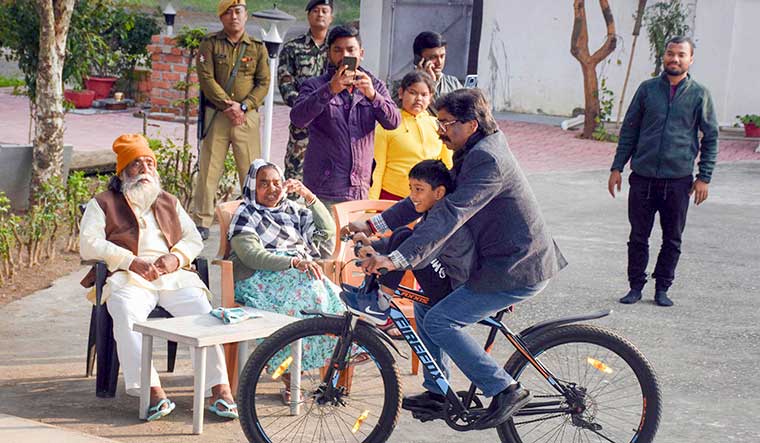ANOTHER STATE, another set of disappointing results for the BJP. The party is learning the hard way that the outcome of state elections can be very different from those of the national polls. It has lost Maharashtra, Rajasthan, Madhya Pradesh, Chhattisgarh and now Jharkhand, all within a year. That too, in a year when it won a massive mandate in the Lok Sabha. In Jharkhand, where the saffron party won 11 of 14 Lok Sabha seats, its vote share dropped nearly 20 per cent in the assembly elections. The BJP won only 25 of the 81 seats; even the outgoing chief minister Raghubar Das lost.
Chief ministerial candidate Hemant Soren, 44, led the Jharkhand Mukti Morcha (JMM) in a coalition with the Congress and the Rashtriya Janata Dal. The coalition won 47 seats. With 30 seats, the JMM became the single largest party, a position held by the BJP since the state’s formation 19 years ago.
The BJP’s defeat in Jharkhand is significant ahead of the Delhi elections in February, and the Bihar elections in October-November. The BJP leadership will be looking to rework its strategy for the state elections, as national issues have not paid them the desired dividend in the states.
BJP national spokesperson Bizay Sonkar Shastri admitted that the party had failed to convince people of its development agenda. During the month-long electioneering, BJP leaders including Prime Minister Narendra Modi and Union Home Minister Amit Shah raised national issues like the Ram temple, abrogation of Article 370 in Jammu and Kashmir and the Citizenship (Amendment) Act. On the contrary, the JMM, the Congress and other regional parties were raising local issues like jal, zameen aur jungle (water, land and forest), which are important in the tribal dominated state.
The All Jharkhand Student Union ceased to be a BJP ally after 19 years, and its chief, Sudesh Mahto, slammed the BJP leadership for “ignoring” local issues. “In the state, you cannot go to the public raising issues like the Ram temple or Article 370. Rather, you should concentrate on your deeds for the state in the last five years, ranging from electricity to roads to job creation,” Mahto told THE WEEK.
The BJP failed to carry along other allies also—the Janata Dal (United) and Lok Janshakti Party contested on their own—and it cost the party dearly. In 2014, the BJP and the AJSU won a total of 35 per cent votes (BJP 31 per cent and AJSU 4 per cent). This time, the BJP got 34 per cent of the votes and the AJSU, 9 per cent, but both lost seats. On other side, the JMM-Congress-RJD alliance remained intact. Hemant Soren won from both Dumka and Barhet seats.
Moreover, the BJP’s experiment of making Das the state’s first non-tribal chief minister also failed. After coming to power at the Centre in 2014, the BJP tried picking chief ministers from castes other than the dominant one. In Maharashtra, Devendra Fadnavis, a Brahmin, was made chief minister instead of a Maratha leader. Manohar Lal Khattar, a Punjabi Khatri, was given the post in Haryana instead of a Jat leader.
In July 2018, tribals from over 200 villagers launched the ‘Pathalgadi movement’ to protest the state government’s attempt to tweak their land rights. Instead of reaching out to the locals, Das’s government went after the tribals and booked nearly 10,000 for sedition. In early 2018, the Das government also tried but failed to amend pre-independence era laws—Chhota Nagpur Tenancy Act and Santhal Pragana Tenancy Act—that give tribals the right to protect their land from the government and corporates.
Of 47 seats won by the JMM-led alliance, over two-thirds came from districts that have more than 28 per cent tribal population. On the contrary, BJP only managed to win five seats from these places. The BJP has managed to win only two out of the 28 reserved seats.
Ground reports suggest a lack of communication between BJP leaders and workers. Allocation of tickets to outsiders, or turncoats, over party loyalists dented morale. Das is also accused of sidelining leaders like Arjun Munda, an influential leader from the tribal community. Saryu Roy, a BJP veteran who stood as an independent this time, defeated Das in his constituency. He was upset over the denial of a ticket.
Roy, an anti-corruption crusader, was a minister in Das’s cabinet. His exposé on the fodder case and the coal scam led to the conviction of former chief ministers of Bihar and Jharkhand, Jagannath Mishra, Lalu Yadav, and Madhu Koda. In an earlier interaction with THE WEEK, Roy said his next target was Das.
Das was also seen as an outsider by the people of Jharkhand. He hails from Chhattisgarh. “Selecting Rabhubar Das as chief minister was a mistake, as he never understood Jharkhand and its people,” said Mahto. BJP state president Laxman Giluwa also could not win from his constituency, Chakradharpur.
The growing popularity of Soren, who served as chief minister for 17 months in 2013-14, was another factor. For the elections, he hired a team of experts in sociology and public policy from institutions like Oxford, Sussex, Essex and TISS. The team travelled to remote areas of Jharkhand to provide the JMM with inputs for its election manifesto.
“We have a blueprint to run the government,” said Soren, during his campaign. “Our government will look into core issues like water, forest and land.” Responding to the opposition’s charges of dynasty politics, Soren said, “Sher ka bachha toh sher hi hoga na? (A lion’s cub will be a lion, right?) No one has a problem if a cobbler’s son is a cobbler.”


